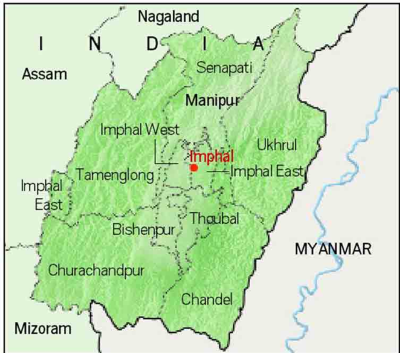Context:
The recent directive from the Centre to the Manipur Government to scrutinize a representation aiming for the delisting of specific Kuki and Zomi tribes from the Scheduled Tribes (ST) list of Manipur has ignited fresh tensions in the already strained socio-political environment of the state.
Background:
The roots of the representation can be traced back to the eighth month of an ethnic conflict that erupted on May 3, 2023, between the Meitei people in the valley and the Kuki-Zo (ST) communities in the hills. This conflict was reportedly triggered by a Manipur High Court order instructing the State government to recommend the inclusion of Meiteis in the ST list to the Centre. In response to the Centre's directive to examine the representation seeking the delisting of certain Kuki and Zomi tribes, the Manipur Chief Minister announced the potential formation of a special committee to investigate the matter. This move has intensified the ongoing ethnic conflict, exacerbating tensions between communities.
Representation's Argument:
The representation objects to the inclusion of three specific entries in the ST list of Manipur — "Any Mizo(Lushai) Tribes," "Zou," and "Any Kuki Tribes." The primary argument for the exclusion of these entries revolves around the claim that these tribes are not "indigenous" to the land of Manipur. The representation contends that there is no historical mention of these particular tribes residing in Manipur in pre-Independence Censuses. Furthermore, it alleges that the vague terms "Any Mizo (Lushai) Tribes" and "Any Kuki Tribes" in the ST list have facilitated illegal immigrants from Myanmar and Bangladesh in obtaining benefits meant for STs in India.
Examination of Claims:
Contrary to the representation's assertions, the argument that these communities were not present in Manipur at the time of the first Constitution (Scheduled Tribes) list in 1950 is flawed. The initial order had indeed listed three broad tribes for Manipur — "Any Kuki Tribe," "Any Lushai Tribe," and "Any Naga Tribe," under which respective sub-tribes were to be subsumed. Additionally, there is no concrete empirical evidence to support the claim that the presence of these tribes in the ST list has facilitated organized illegal immigration into Manipur. The allegations appear to be based more on individual instances and rhetoric than on substantiated data.
Historical Perspectives and Commission Recommendations:
The First Backward Classes Commission in its 1955 report acknowledged the origin of the three broad tribe classifications (Kuki, Lushai, and Naga) under British administration. However, it recommended that individual tribe names be added to the ST list for Assam and the hills of Manipur instead of umbrella tribes due to the outdated nature of the information. Subsequently, in the 1956 revision of the ST list for Manipur, 29 entries with individual tribe names were included, with the exception of "Any Mizo (Lushai) Tribe," which was retained. The representation challenges these entries, asserting that neither "Zou" nor "Any Mizo (Lushai) Tribe" was specifically recommended by the First Backward Classes Commission.
In 1965, the Lokur Commission reported a "splintering tendency" among Kuki tribes, with sub-groups and clans seeking distinct identities. This tendency led to the recommendation that individual tribe names be mentioned in the ST list to address inter-tribe differences. Despite this, in 2002-2003, "Any Kuki Tribes" was added to the ST list of Manipur. The Bhuria Commission Report of 2002-2004 recognized the confusion caused by this addition and recommended specifying tribe names in the ST list to prevent inter-tribe differences.
Implications on ST Criteria and Community Divides:
The Meitei community's attempt to argue for ST status by contesting the inclusion of specific Kuki and Zomi tribes in the list is unprecedented. This move raises concerns about the criteria used to define groups as STs, which have remained unchanged since the Lokur Commission introduced them in 1965. The potential delisting of certain Kuki and Zomi tribes could have far-reaching implications on existing divides among communities in Manipur.
The conflict between Meitei people and Kuki-Zo (ST) communities has intensified due to these developments. The Meitei community has historically advocated for ST status to address issues such as land ownership restrictions in forested hill districts. However, the current approach of contesting the ST status of specific tribes within Manipur could further polarize communities and deepen existing divisions.
Conclusion:
The scrutiny of a representation seeking the delisting of specific Kuki and Zomi tribes from the Scheduled Tribes list in Manipur brings forth historical complexities, commission recommendations, and ongoing ethnic conflicts. While the claims made in the representation lack strong empirical support, they underscore the need for a nuanced examination of the criteria used for ST classification.
The historical perspectives provided by the First Backward Classes Commission and the Lokur Commission highlight the evolution and challenges associated with the classification of tribes in Manipur. The potential consequences of delisting certain tribes on community relations and the criteria for ST classification demand careful consideration.
As Manipur contemplates forming a special committee to examine the representation, it is crucial to engage in a transparent and inclusive dialogue involving all stakeholders. Balancing the aspirations of different communities, addressing historical grievances, and ensuring equitable representation in the ST list are paramount for fostering harmony and inclusivity in Manipur's diverse social fabric. The outcome of this deliberative process will likely shape the trajectory of inter-community relations and the criteria for Scheduled Tribe classification in the state.
|
Probable Questions for UPSC Mains Exam
|
Source – The Hindu







